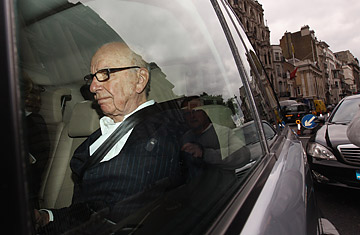
Rupert Murdoch, chief executive officer of News Corp., is driven from his apartment in London on July 13, 2011
The tabloid saga gripping Britain — a tangled tale of criminality and corruption, of politicians in thrall to the power of the press and of police in the press's pay — has elements of farce but even more of tragedy. Take Graham Foulkes, whose 22-year-old son David was one of 52 people killed by suicide bombers in London six years ago. The police have informed Foulkes that in the immediate aftermath, his mobile phone may have been hacked by Glenn Mulcaire, a private investigator working for the News of the World, a Sunday tabloid owned by News International, the U.K. subsidiary of the U.S.-based media giant News Corp. "It fills me with horror," Foulkes told the BBC. "You think it's as dark as it can get. Then you realize there's someone out there who can make it darker."
That sentiment might resonate with the family of Milly Dowler, whose phone was allegedly hacked — and some of its messages erased — during the manhunt that followed her 2002 disappearance at age 13, raising false hopes that she was alive. The eyes and ears were everywhere: parents of other murdered children were alerted that they too may have been targeted, as well as the relatives of dead soldiers and even the police who were investigating the tabloids for their tactics — nearly 4,000 people in all. Nothing was sacred; no one was safe. Getting the story was everything.
For decades there have been three main forces in British politics: the Conservative and Labour parties, alternately holding power and seeking it, and Rupert Murdoch and his "red-tops," the News of the World and the Sun, so called for the scarlet mastheads that signaled to readers there would be nothing too highbrow in their pages. The tabloids are fast and raw and raunchy, a torment to celebrities who put any premium on privacy and a snarling check on the arrogance of politicians who pad expense reports or fool around on the side. So much power, so much promise — it had to be painful to issue a death warrant for the 168-year-old News of the World, executed on July 10 by Murdoch's son and heir apparent James.
The killing of the lucrative tabloid was intended to bury the scandal that threatened this extraordinary power base. Instead, it has brought Murdoch, the Australian-born founder, chairman and CEO of News Corp., to the drama's center stage.
The House of Murdoch
There are plenty in the global mediasphere who relish the sight of the great tabloid baron being pursued by the very paparazzi he'd paid and promoted. Murdoch's empire, which stretches in print, broadcast and digital media from Australia across Asia and Europe to the U.S., is more than a collection of trophies, and Murdoch is more than a media honcho. In the U.S., he expanded network television by creating Fox Broadcasting; he revalued nearly every major sport by inflating the price of broadcast rights; he rewired the circuits of political discourse by devising the right-leaning Fox News Channel. And he staked his claim to muscular journalism for the ruling class when he bought the Wall Street Journal in 2007. In the U.K. in the 1970s and '80s, he was the interloper of Fleet Street, a hated figure who bought broken newspapers and then broke the back of the newspaper unions in his effort to yank the industry into the 20th century. Murdoch won that battle and went on to pummel his rivals in an unrelenting circulation war that didn't end until he had control of the upscale Times and the downmarket Sun as well as the News of the World.
This makes Murdoch a cultural force the likes of which we haven't seen since William Randolph Hearst. When Murdoch calls, PMs and Presidents from Beijing to Rome answer the phone. In that respect, successive British leaders have acted no differently than their counterparts abroad, though they sprinted for the phone more eagerly. Prime Minister David Cameron admitted as much at a July 8 press conference. "The truth is, we have all been in this together," he said. "The press, politicians and leaders of all parties — and yes, that includes me."
Murdoch flew to London in time to pick up the last edition of the News of the World. He and James, News Corp.'s deputy COO and chairman of News International, smiled beatifically for the cameras. Later James defended the honor of Rebekah Brooks, News International's beleaguered chief executive. "I am satisfied that she neither had knowledge of nor directed those [hacking] activities," he told the BBC. His father refused formal interviews but answered a reporter's shouted inquiry about what his priority is by extending a paternal arm toward Brooks. "This one," he said.
Murdoch's other priority was his company's ambition to take full control of British Sky Broadcasting, the U.K.'s biggest satellite broadcasting company, of which News Corp. holds a 39% share. But in a rare show of cross-party unity, the Conservative-led coalition government agreed to back a motion proposed by Labour opposition leader Ed Miliband calling on Murdoch to withdraw the bid. On July 13, in an even rarer show of submission to public pressure, Murdoch did.
That was just the latest in a series of body blows to a mogul whose survival skills have proved epic. His company lost 15% of its value in the week after the scandal erupted, prompting News Corp. to announce a $5 billion buyback plan to prop up the stock. MPs have asked Murdoch to attend a meeting next week in what would be their first chance to quiz him since he was called before a parliamentary committee in 1981 as he prepared to buy the Times of London.
